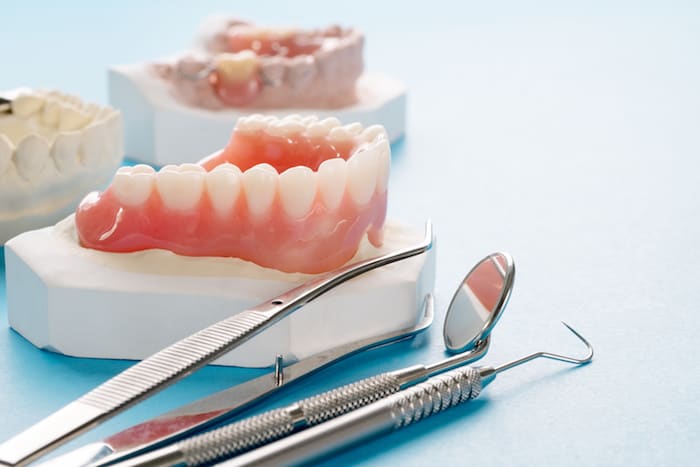Dentures are oral appliances used as an effective solution for people who have lost permanent teeth due to aggressive tooth decay, aging, or accidents. Previously considered to be ideal only for elderly patients, the dentures used in modern dentistry are now suited for all ages. Moreover, they’re made to look more natural and comfortable to wear.
Patients may initially be apprehensive about the idea of using dentures. Thoughts regarding how it would look, fit, and how much it costs usually comes to mind. Therefore, it’s vital that you consult your dental professional about the procedures and costs involved in getting dentures. Your dental professional can assist you in the whole process of choosing the right dentures and maintaining them.
You might not consider dentures as your natural teeth, but keeping them clean is still essential to avoid oral health problems. Since dentures are made to replace your natural teeth, plaque and tartar build-up can still happen. To avoid further oral issues, your dentures have to be cleaned properly and brushed daily.
Types Of Dentures
Dentures also come in varying types. The most common types of dentures are:
- Complete dentures – This is a full-coverage device that replaces a complete arch of missing teeth. This type of denture is mostly used on older patients who have completely lost all their natural teeth. Complete dentures can be pre-made for immediate fixing or customized to fit the needs of the patient.
- Partial dentures – An alternative option to replace several missing teeth for people who don’t have an entire lower or upper set of teeth missing. Partial dentures are mostly removable, but there are types that are surgically implanted for more stability.

Common Problems With Dentures
Getting dentures and wearing one for the first time might be nerve-wracking. You might encounter problems such as damages, dents, or stains to your dentures. Your dentist can usually provide immediate remedies for such issues.
Listed below are other common denture problems you might experience as a first-time user:
- Gum Irritation
If you experience irritation in the gums when you wear dentures for the first time, keep in mind that this is normal. This is usually a result of the constant rubbing of your dentures to your gums. Other patients might even experience pain since their gums and mouth are adapting to the changes created by the dentures.
To alleviate irritation or pain on your gums, you may do the following:
- Apply a topical gel or cream for oral pain relief.
- Massage your gums regularly to reduce swelling.
- Take medication.
- Rinse your mouth with salt to reduce inflammation.
- Remove your dentures while you sleep so that your gums can rest from the pressure applied by your dentures.
If the pain doesn’t subside or if it worsens, always remember to contact your dentist immediately.
- Loose Dentures
You might notice over time that your dentures can come loose or slip out of position when you talk, laugh, or eat. This common problem is generally due to your gums shrinking. When this happens, you might experience discomfort and hear a clicking noise every time you talk or eat. If you don’t get this treated at once, your mouth sores might worsen even further and cause significant difficulty in eating.
Moreover, if you’re experiencing loose dentures, consult your dentist on the proper measures needed to fix them. Dental professionals might suggest that you use denture adhesives. Adhesives or fixatives can provide support and stability to your dentures. These can be in the form of strips, creams, gels, or powder. Adhesives create a seal that prevents your dentures from moving and getting food particles in between them.
- Having A Tough Time Eating
Getting used to eating with dentures might take some time. You might notice that after getting your new dentures, eating foods such as chewy chocolate or nuts can be a nuisance. Bits of food may get stuck between your dentures and it might be hard to clean or remove them.
Eating slowly can be one way of solving this problem, especially when you just had your dentures placed. You may also try choosing food that’s softer to chew or cut them into smaller pieces for easier eating.
- Difficulty In Talking
Another problem caused by new dentures is that they might alter the way you speak. Moving your tongue around your dentures while trying to talk could feel awkward at first.
You may practice reading aloud or singing a song to exercise your mouth and tongue. This enables you to easily adapt to your new dentures. Forming the correct words and sounds might be challenging, but in time you’ll eventually get used to it.
- Mouth Infections
Some patients might experience mouth sores or infections caused by prolonged use of dentures. Consequently, infections can cause painful inflammation around the corners of your mouth. You might also discover small red bumps and general redness around the area. These infections, fortunately, are treatable through medicines and proper dental hygiene.
To avoid further infections, remember to soak your dentures in cleaning solutions when you’re not wearing them. Use a soft-bristle brush to scrub the dirt from your dentures. Moreover, it’s equally important that you make sure to clean your gums, tongue, and the roof of your mouth.
Conclusion
Using dentures usually causes stress and anxiety to the majority of patients. By talking to a professional dental practitioner, you’ll be able to effortlessly find the perfect type of dentures that would best fit your needs without causing too many problems. Your dentists can guide you through the treatment process and provide proper information on the maintenance care of your dentures.
Throughout the year, our writers feature fresh, in-depth, and relevant information for our audience of 40,000+ healthcare leaders and professionals. As a healthcare business publication, we cover and cherish our relationship with the entire health care industry including administrators, nurses, physicians, physical therapists, pharmacists, and more. We cover a broad spectrum from hospitals to medical offices to outpatient services to eye surgery centers to university settings. We focus on rehabilitation, nursing homes, home care, hospice as well as men’s health, women’s heath, and pediatrics.








